A
Auto Express
Guest
The Renault Zoe Van is the smallest electric van for sale in the UK. Sure, the Twizy Cargo is smaller still, but if you want to carry anything resembling a decent payload, as well as a driver and passenger in comfort, then the Zoe Van is the answer. The model has been on sale in Europe for a few years, but it only went on sale in the UK in mid-2020.
The Zoe Van is based on the Zoe supermini, and from the outside, the cargo carrier has a look that's identical. It retains the Zoe's five-door shape, while the front cabin is also the same, so features the latest touchscreen technology borrowed from the Clio. Under the skin it's the same as the Zoe supermini, too, so it has a 50kWh battery and adaptive charging tech that allows you to top up from a variety of sources. Renault claims a range of 245 miles for the van, which is the same as the Zoe supermini's.
The changes to the van start with the rear doors, which feature opaque black film added to the inside of the windows. The door cards remain, but they're stripped of electric window switches, and the windows themselves are fixed in place - this is part of the requirement for classifying the Zoe Van as a commercial vehicle.
The Zoe Van's other big changes are the addition of a steel mesh bulkhead behind the front seats while the rear seat cushions, seatbelts and all their attachments are missing. In their place is a level floor that extends from the bulkhead to the inside of the tailgate to create a flat load area. This is held in place by a steel frame that is lined with fabric to prevent items falling out of the side doors when they're open, while an additional load cover is added to the existing Zoe parcel shelf to help keep the van's contents out of sight. In addition, the flat-floor layout creates more hidden storage where the supermini's footwells are.
All of these revisions do little to change the character of the Zoe, and the van variant drives exactly like the supermini. That means sprightly performance off the line, but a rather mundane experience in corners thanks to the weight of the battery.
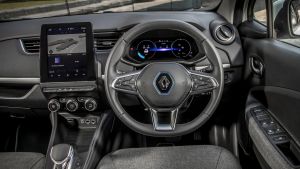
image
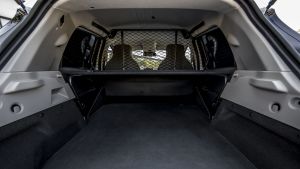
image
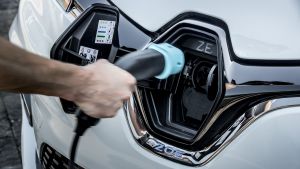
image
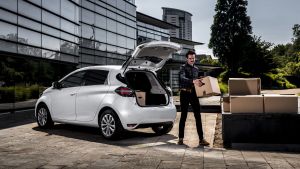
image
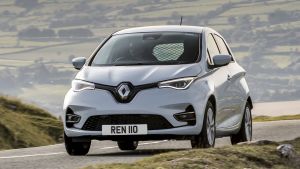
image
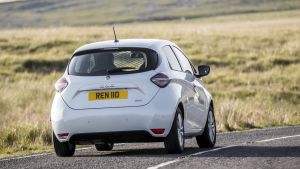
image
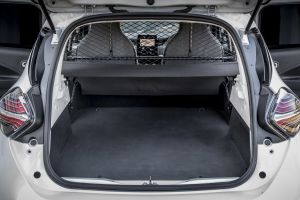
image
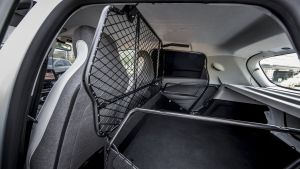
image
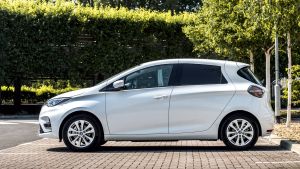
image
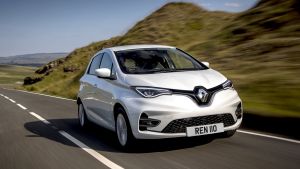
image
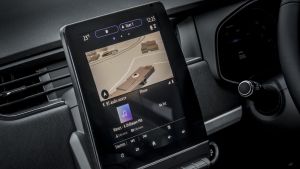
image
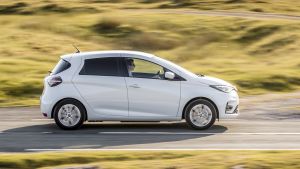
image
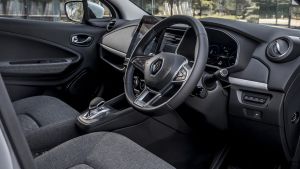
image
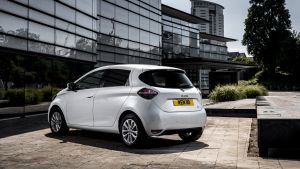
image
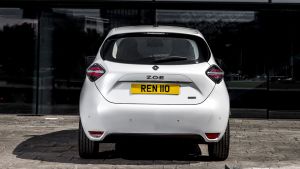
image
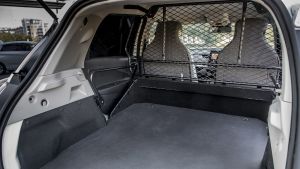
image
The Zoe Van range comprises Business and Business+ variants, and these largely follow the supermini's Play and Iconic trims, so the latter features luxuries such as alloy wheels, rear parking sensors, climate control, wireless charging and sat-nav.
Since it's the only car-derived electric van for sale, there are no direct rivals for the Zoe Van. If you want something sportier, the Ford Fiesta Sport Van is available with petrol power, a more fun driving experience and a bit more space inside. If you want to stick with zero emissions but need more cargo capacity, then the Renault Kangoo ZE or Nissan e-NV200 aren't much more expensive, but can't match the Zoe Van for style.
If you only need a modest carrying capacity from a commercial vehicle but excellent refinement and a stylish eco-conscious image, then the Zoe Van fits the bill. It's a bit of a niche choice in an already small market, but we're sure it'll find its takers.
As with any electric vehicle, the Zoe Van has a relatively high initial purchase price, but this is offset by low running costs, and the total cost of ownership (TCO) should be competitive for anyone looking closely at the bottom line. One advantage that the Zoe Van has over the supermini is that it qualifies for the Government's Plug-in Van Grant. Thanks to the Zoe Van's list price, this knocks 20% off the list price (which means up to £6,800 is knocked off), compared to only £3,000 off the price of the supermini. As a result, list prices start from just under £20,000 ex-VAT for the Zoe Van Business, with the most expensive model being the Business+ version with optional rapid charging added, which is around £700 more.

image

image

image

image

image

image

image

image

image

image

image

image

image

image

image

image
The Zoe Van's 50kWh battery is good for an official range of 245 miles, but Renault does offer a range calculator on its website that shows you how far the Zoe Van will go on a full charge in different conditions, such as different temperatures and with different payloads on board. There's also a guide on charging times, with a 0-80% recharge taking just over an hour from a 50kW DC charger, but a massive 29 hours form a domestic plug socket.
However, Renault is currently offering a free wallbox installation (subject to survey) for Zoe Van buyers. This sees a 7kW charger fitted at a location of your choice, and means a 0-80% charge will take just under seven hours.
The Zoe Van is very stylish for a commercial vehicle, but there are major compromises to be made in terms of practicality. The flat cargo floor reaches all the way from the steel mesh bulkhead to the tailgate and offers a decent carpeted floor area of around 1.2 square metres. That offers slightly more practicality than a Zoe supermini with the back seats folded, but also has the addition of four lashing eyes so you can tie items down to stop them moving around.
Keep the parcel shelf and additional folding load cover in place, and there's a modest cargo volume of one cubic metre below them, which is only really suitable for short items to sit beneath it. The load cover is removable, and while this creates more space, items will be clearly visible through the hatchback glass. The Zoe Van has a payload of up to 457kg, which is some way behind even the most modest version of the Renault Kangoo ZE.
As well as the main load area, there is hidden space located below the cargo floor in the space where the Zoe supermini's footwells are. This doubles as a handy spot to store the charging lead, because while there is some storage under the cargo floor, the heavy floor lining is a struggle to lift.

image

image

image

image

image

image

image

image

image

image

image

image

image

image

image

image
The side doors help access to the load area, while the heavily darkened windows help with security. One quirk of the Zoe Van is that these rear doors retain some, but not all, of the supermini's functionality. So you get a full door card to keep it aesthetically appealing, but it's stripped of its electric window mechanism (the switch is still there because you'd be left with a hole otherwise) and there's no speaker for the stereo. It does retain the child locks, though, so the doors can't be opened from the inside, although how and why you'd end up in the cargo area of a Zoe Van raises more questions than answers.
Elsewhere, while the seatbelts aren't present, there are holes in the C-pillar trim where the central three-point seatbelt would be located. At least the rear grab handle points are put to good use by providing a sturdy location to bolt the steel mesh bulkhead in place.
Since the Renault Zoe Van is based on the Zoe supermini, we have a pretty clear indication how the van will perform in terms of reliability and safety. The van has the same 8-year/100,000-mile warranty on the traction battery as the supermini, which is longer than the 5yr/62k cover for the larger Kangoo and Master ZEs. And like the supermini, the warranty covers against deterioration of the battery pack, so if it doesn't charge to more than 80% in years 1-3 (or 70% in years 4-8), the pack will be covered.
As the Zoe Van is a light commercial vehicle (LCV), it's covered by a slightly different powertrain warranty to the supermini. It covers the van for four years instead of five, but the 100,000-mile limit still remains. The same goes for the warranty for the rest of the Zoe Van, because it's covered for 3 years/100,000 miles, not 5 years like the hatch.

image

image

image

image

image

image

image

image

image

image

image

image

image

image

image

image
All vans feature stability and traction control, plus ABS with electronic brake force distribution. An electric parking brake is standard and this comes with auto-hold and hill-start assist, while tyre pressure monitors are fitted as standard, too.
The Zoe's five-star Euro NCAP rating also carries over to the van, and with driver and passenger airbags, plus that steel mesh bulkhead preventing items in the cargo area flying forward, you can be sure that the van will be just as strong as the hatch should the worst happen.
As with its reliability and safety, the Zoe Van will be similar to the hatch drive. In fact, the only real difference when you're at the wheel is the slightly more restricted over-the-shoulder view because of the blacked-out rear windows, while the mesh of the steel bulkhead is visible when you look through the rear-view mirror.
As with the hatch, the Zoe Van is simple to drive. Keyless entry and starting means all you need to do is put your foot on the brake pedal, press the start button, and the van is ready to go. Select drive, and as you pull away (the electric handbrake releases automatically) the Zoe Van emits a space-age whirr that is familiar from all of Renault's electric vehicles and warns other road users of your presence when moving at low speeds.
The Zoe Van only comes with the R110 engine, so while there's decent acceleration from a standstill, it does run out of steam the faster you go. However, since this electric van is designed to do short hops in urban areas, you're unlikely to be left wanting in terms of performance, while the light steering means the van is a piece of cake to drive around town.
Those heavy batteries mean the Zoe Van rolls a bit in corners, but it at least feels stable and relatively unsettled by lumps and bumps in the road. A maximum payload of around 450kg would be the same as travelling four-up and with luggage in the hatch, and won't have a significant impact on performance thanks to the electric motor's torquey power delivery, although battery range will take a hit.

image

image

image

image

image

image

image

image

image

image

image

image

image

image

image

image
From behind the wheel, the Zoe Van is identical to the hatchback. That means it has the same dashboard layout and technology that was added to the Zoe with its most recent update. This includes a large touchscreen borrowed from the latest Renault Clio, with the same range of connectivity options, including Android Auto and Apple CarPlay.
Cabin space is good, although fitting the steel mesh bulkhead means that the front seats can't slide as far back as they do in the five-seat hatch. This might be an issue for taller drivers, because you'll have to adopt an awkward driving position to get comfortable. Aside from that, the Zoe Van is easy to get along with, featuring decent tech and reasonable storage, and thanks to its passenger car roots, it barely feels like a van at all.
Continue reading...
The Zoe Van is based on the Zoe supermini, and from the outside, the cargo carrier has a look that's identical. It retains the Zoe's five-door shape, while the front cabin is also the same, so features the latest touchscreen technology borrowed from the Clio. Under the skin it's the same as the Zoe supermini, too, so it has a 50kWh battery and adaptive charging tech that allows you to top up from a variety of sources. Renault claims a range of 245 miles for the van, which is the same as the Zoe supermini's.
The changes to the van start with the rear doors, which feature opaque black film added to the inside of the windows. The door cards remain, but they're stripped of electric window switches, and the windows themselves are fixed in place - this is part of the requirement for classifying the Zoe Van as a commercial vehicle.
- SEE MORE Best electric vans 2020
The Zoe Van's other big changes are the addition of a steel mesh bulkhead behind the front seats while the rear seat cushions, seatbelts and all their attachments are missing. In their place is a level floor that extends from the bulkhead to the inside of the tailgate to create a flat load area. This is held in place by a steel frame that is lined with fabric to prevent items falling out of the side doors when they're open, while an additional load cover is added to the existing Zoe parcel shelf to help keep the van's contents out of sight. In addition, the flat-floor layout creates more hidden storage where the supermini's footwells are.
All of these revisions do little to change the character of the Zoe, and the van variant drives exactly like the supermini. That means sprightly performance off the line, but a rather mundane experience in corners thanks to the weight of the battery.

image

image

image

image

image

image

image

image

image

image

image

image

image

image

image

image
The Zoe Van range comprises Business and Business+ variants, and these largely follow the supermini's Play and Iconic trims, so the latter features luxuries such as alloy wheels, rear parking sensors, climate control, wireless charging and sat-nav.
Since it's the only car-derived electric van for sale, there are no direct rivals for the Zoe Van. If you want something sportier, the Ford Fiesta Sport Van is available with petrol power, a more fun driving experience and a bit more space inside. If you want to stick with zero emissions but need more cargo capacity, then the Renault Kangoo ZE or Nissan e-NV200 aren't much more expensive, but can't match the Zoe Van for style.
If you only need a modest carrying capacity from a commercial vehicle but excellent refinement and a stylish eco-conscious image, then the Zoe Van fits the bill. It's a bit of a niche choice in an already small market, but we're sure it'll find its takers.
As with any electric vehicle, the Zoe Van has a relatively high initial purchase price, but this is offset by low running costs, and the total cost of ownership (TCO) should be competitive for anyone looking closely at the bottom line. One advantage that the Zoe Van has over the supermini is that it qualifies for the Government's Plug-in Van Grant. Thanks to the Zoe Van's list price, this knocks 20% off the list price (which means up to £6,800 is knocked off), compared to only £3,000 off the price of the supermini. As a result, list prices start from just under £20,000 ex-VAT for the Zoe Van Business, with the most expensive model being the Business+ version with optional rapid charging added, which is around £700 more.

image

image

image

image

image

image

image

image

image

image

image

image

image

image

image

image
The Zoe Van's 50kWh battery is good for an official range of 245 miles, but Renault does offer a range calculator on its website that shows you how far the Zoe Van will go on a full charge in different conditions, such as different temperatures and with different payloads on board. There's also a guide on charging times, with a 0-80% recharge taking just over an hour from a 50kW DC charger, but a massive 29 hours form a domestic plug socket.
However, Renault is currently offering a free wallbox installation (subject to survey) for Zoe Van buyers. This sees a 7kW charger fitted at a location of your choice, and means a 0-80% charge will take just under seven hours.
The Zoe Van is very stylish for a commercial vehicle, but there are major compromises to be made in terms of practicality. The flat cargo floor reaches all the way from the steel mesh bulkhead to the tailgate and offers a decent carpeted floor area of around 1.2 square metres. That offers slightly more practicality than a Zoe supermini with the back seats folded, but also has the addition of four lashing eyes so you can tie items down to stop them moving around.
Keep the parcel shelf and additional folding load cover in place, and there's a modest cargo volume of one cubic metre below them, which is only really suitable for short items to sit beneath it. The load cover is removable, and while this creates more space, items will be clearly visible through the hatchback glass. The Zoe Van has a payload of up to 457kg, which is some way behind even the most modest version of the Renault Kangoo ZE.
As well as the main load area, there is hidden space located below the cargo floor in the space where the Zoe supermini's footwells are. This doubles as a handy spot to store the charging lead, because while there is some storage under the cargo floor, the heavy floor lining is a struggle to lift.

image

image

image

image

image

image

image

image

image

image

image

image

image

image

image

image
The side doors help access to the load area, while the heavily darkened windows help with security. One quirk of the Zoe Van is that these rear doors retain some, but not all, of the supermini's functionality. So you get a full door card to keep it aesthetically appealing, but it's stripped of its electric window mechanism (the switch is still there because you'd be left with a hole otherwise) and there's no speaker for the stereo. It does retain the child locks, though, so the doors can't be opened from the inside, although how and why you'd end up in the cargo area of a Zoe Van raises more questions than answers.
- SEE MORE Best small vans to buy 2020
Elsewhere, while the seatbelts aren't present, there are holes in the C-pillar trim where the central three-point seatbelt would be located. At least the rear grab handle points are put to good use by providing a sturdy location to bolt the steel mesh bulkhead in place.
Since the Renault Zoe Van is based on the Zoe supermini, we have a pretty clear indication how the van will perform in terms of reliability and safety. The van has the same 8-year/100,000-mile warranty on the traction battery as the supermini, which is longer than the 5yr/62k cover for the larger Kangoo and Master ZEs. And like the supermini, the warranty covers against deterioration of the battery pack, so if it doesn't charge to more than 80% in years 1-3 (or 70% in years 4-8), the pack will be covered.
As the Zoe Van is a light commercial vehicle (LCV), it's covered by a slightly different powertrain warranty to the supermini. It covers the van for four years instead of five, but the 100,000-mile limit still remains. The same goes for the warranty for the rest of the Zoe Van, because it's covered for 3 years/100,000 miles, not 5 years like the hatch.

image

image

image

image

image

image

image

image

image

image

image

image

image

image

image

image
All vans feature stability and traction control, plus ABS with electronic brake force distribution. An electric parking brake is standard and this comes with auto-hold and hill-start assist, while tyre pressure monitors are fitted as standard, too.
The Zoe's five-star Euro NCAP rating also carries over to the van, and with driver and passenger airbags, plus that steel mesh bulkhead preventing items in the cargo area flying forward, you can be sure that the van will be just as strong as the hatch should the worst happen.
As with its reliability and safety, the Zoe Van will be similar to the hatch drive. In fact, the only real difference when you're at the wheel is the slightly more restricted over-the-shoulder view because of the blacked-out rear windows, while the mesh of the steel bulkhead is visible when you look through the rear-view mirror.
As with the hatch, the Zoe Van is simple to drive. Keyless entry and starting means all you need to do is put your foot on the brake pedal, press the start button, and the van is ready to go. Select drive, and as you pull away (the electric handbrake releases automatically) the Zoe Van emits a space-age whirr that is familiar from all of Renault's electric vehicles and warns other road users of your presence when moving at low speeds.
The Zoe Van only comes with the R110 engine, so while there's decent acceleration from a standstill, it does run out of steam the faster you go. However, since this electric van is designed to do short hops in urban areas, you're unlikely to be left wanting in terms of performance, while the light steering means the van is a piece of cake to drive around town.
Those heavy batteries mean the Zoe Van rolls a bit in corners, but it at least feels stable and relatively unsettled by lumps and bumps in the road. A maximum payload of around 450kg would be the same as travelling four-up and with luggage in the hatch, and won't have a significant impact on performance thanks to the electric motor's torquey power delivery, although battery range will take a hit.

image

image

image

image

image

image

image

image

image

image

image

image

image

image

image

image
From behind the wheel, the Zoe Van is identical to the hatchback. That means it has the same dashboard layout and technology that was added to the Zoe with its most recent update. This includes a large touchscreen borrowed from the latest Renault Clio, with the same range of connectivity options, including Android Auto and Apple CarPlay.
Cabin space is good, although fitting the steel mesh bulkhead means that the front seats can't slide as far back as they do in the five-seat hatch. This might be an issue for taller drivers, because you'll have to adopt an awkward driving position to get comfortable. Aside from that, the Zoe Van is easy to get along with, featuring decent tech and reasonable storage, and thanks to its passenger car roots, it barely feels like a van at all.
Continue reading...
